In societies the world over, teenagers are blamed for staying up late, then struggling to wake up in the morning. While it’s true that plenty of teenagers (like many adults) do have bad bedtime habits, researchers have long since proven that this global problem has a biological cause.
In 2004, researchers at the University of Munich proved that teenagers actually have a different sense of time. Their study showed that the 24-hour cycle which determines when you wake and sleep gets later during your teens, reaching its latest point by the age of 20.
After 20, the body’s waking and sleeping times gradually get earlier again, until at 55 you naturally wake about the same time as you did when you were 10. The link between the movements of this biological clock and the process of puberty was so strong that the researchers suggested this “peak lateness” at the end of the teenage years could be the biological marker for the end of puberty.
Sleep deprived
At about the same time the Munich study came out, Russell Foster at the University of Oxford made a key breakthrough in the neuroscience of time. By raising blind mice, Foster was able to show that all mammals’ sleep times depended on sunlight only. This means that biological time – which determines when you feel sleepy – is different from social time, which is set by clocks and customs about when things should be done.
– Paul Kelley
Read More: The Biological Reason why it’s so Hard for Teenagers to Wake up Early for School
Image by Gregory Pappas from Unsplash







Leave A Comment